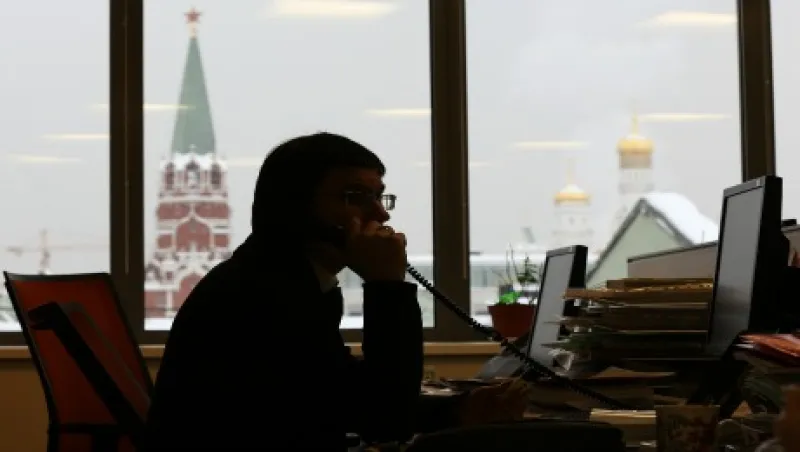Emerging-markets equities remain largely out of favor with investors, which is not surprising, given the 4.27 percent decline in the MSCI emerging-markets index this year, as of November 7. And within the EM world, few markets get as much love these days as Russia. For one value investor, however, that’s a buying signal.
“Russia is one of the, if not the most, hated markets within the emerging-markets space,” says Slim Feriani, chief executive officer and chief investment officer at Advance Emerging Capital, a $750 million London-based fund manager. “From a contrarian point of view, it is a good thing. It’s a good entry point because everyone else avoids it.” The fund has 12 percent of its assets in Russian equities, compared with the country’s roughly 6 percent weighting in the MSCI emerging-markets index, making Russia the fund’s highest-conviction country.
The Russian market trades at an average of 5.8 times earnings, far below the average price-earnings multiple of 10 for the MSCI EM index. Russia’s price-to-book ratio is also very low, at only 0.8, compared with a 1.5 for the broad index. “Emerging markets are not very expensive in general, but then Russia is extremely cheap – the cheapest you’ll find out there,” says Feriani.
The poor rating of the Russian market reflects in part the low valuations in the country’s big energy sector. But even outside the oil and gas sector, Russian equities generally trade at roughly 7.5 to 8 times earnings, well below the emerging-markets index average.
For a country with a growing middle class, such modest valuations are attractive, says Feriani. Market intelligence service Euromonitor International estimates that 50 million of Russia’s 140 million people are middle class. Russia’s per capita gross domestic product stands at $18,083 on a purchasing power parity basis, according to the International Monetary Fund’s 2013 World Economic Outlook, making it the most prosperous of the BRIC countries. Euromonitor forecasts that consumer disposable incomes will grow by 5 percent a year in inflation-adjusted terms during the next five years.
Feriani believes that growth will benefit stocks in areas like consumer lending, retail, transport, real estate, IT, mobile technology, health care and pharmaceuticals. “If you can find a way to get exposure to these sectors, then you can do pretty well during the next five years, rather than the next five weeks,” he says.
Advance, founded in 1996 by executive chairman Nigel Wilson, a former head of the investment unit at the Bank of England, doesn’t invest directly in emerging markets. Instead, it seeks to identify the top fund managers in the countries in which it wants exposure and invests with them, making it more of a fund of funds. “We don’t want to reinvent the wheel sitting here in London and try to pick stocks across 50 countries,” says Feriani.
S&P Capital IQ gives Advance a gold rating for its two closed-end funds, Advance Developing Markets Fund and Advance Frontier Markets Fund.
The $470.9 million Advance Developing Markets Fund, the largest of the firm’s five funds, was launched in 1998 and outperformed the MSCI emerging-markets index until 2008. Since then its record has been uneven, according to Peter Fuller, an analyst at S&P Capital IQ in London. It underperformed in 2008 and 2009, outperformed the index in 2010 but went sluggish again in 2011. Last year its performance fell slightly below that of the index, with negative returns in Russia and Brazil mostly offset by gains in East Asia, according to Fuller. “Towards the end of 2012, the fund became more focused,” says Fuller, trimming its holdings from 50 to 40 fund managers “to cover only the best ideas.”
The fund has closely tracked the index, matching the 4 percent decline in the MSCI emerging-markets index in the first nine months of this year. The fund’s Russia weighting didn’t hurt. The MSCI Russia index is up 0.29 percent this year as of November 7, well ahead of the broader EM index.
One of the firms Advance relies on in Russia is Baring Vostok Capital Partners. The four funds, worth a total of $3.8 billion, make the private equity firm the largest in Russia and has turned out to be one of Advance’s best-performing investments. It has delivered average annual returns of 35 percent for Advance since 2002, according to Feriani.
Baring Vostok made its mark by investing in the early-stage development of Yandex, Russia’s most popular Internet search engine, which trades on the Nasdaq (YNDX). The private equity firm acquired 35.7 percent of the business for $4 million when the company was founded in 2000. Today its market cap stands at $12.8 billion. Other top Baring Vostok picks include Volga Gas, an independent oil and gas production company; IDS Borjomi International, the region’s biggest producer of mineral water; and Ozon.ru, Russia’s largest online retailer.
For listed Russian equities, Advance works through the $230 million Verno Capital, founded in 2009 by its chief investment officer Dimitri Kryukov. He came to Verno Capital from Kazimir Partners, which Kryukov co-founded in 2002 and which earned a dazzling return of 460 percent net of fees during his tenure. Verno Capital’s chief investment strategist is Roland Nash, who joined Verno in 2011 from Renaissance Capital, where he worked as chief equity strategist and head of global research.
Among Verno Capital’s picks, Russia’s Sberbank is one of Feriani’s favorites. The former Soviet-era savings bank, Sberbank has developed into a universal bank with an expanding footprint in Eastern Europe. Another Verno Capital pick is 7,650-store retail chain Magnit, founded in 1994 by Russian billionaire Sergey Galitsky.
Fuller at S&P Capital IQ agrees with Feriani that Advance is not for the short-term investor. “For people who are willing to take the risk over the longer term, Advance to date has produced the goods,” Fuller says. He cautions, however, that Russia is very dependent on its oil and gas sector and thus is less diversified than other emerging markets, such as Brazil.
Corruption and poor corporate governance have deterred many foreign investors from Russia over the years, and Feriani concedes that those issues are “a question mark” for Advance. “The one thing that’s frustrating is that the government is not putting its full weight behind taking the country forward in terms of investments, in terms of bringing in foreign investors,” he says. That is holding Russia from advancing to “another level of growth.”
Read more about equities.






